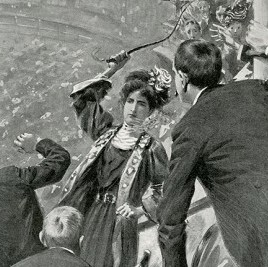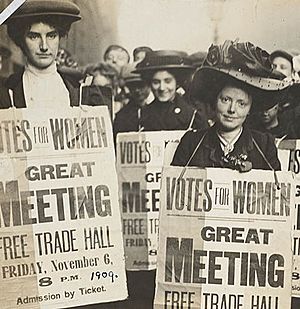Helen Ogston facts for kids
Quick facts for kids
Helen Ogston
|
|
|---|---|

detail of newspaper illustration by Samuel Begg
|
|
| Born |
Helen Charlotte Elizabeth Douglas Ogston
10 June 1882 Aberdeen, Scotland
|
| Died | 4 July 1973 (aged 91) Malvern, Worcestershire, England
|
| Nationality | United Kingdom of Great Britain and Ireland |
| Education | University of Aberdeen |
| Occupation | Suffragette |
| Employer | WSPU |
| Spouse(s) | Dr Eugene Dunbar Townroe Granville Havelock Bullimore |
| Parent(s) | Isabella and Prof Sir Alexander Ogston |
Helen Charlotte Elizabeth Ogston (1882 – 1973) was a brave Scottish woman who fought for women's right to vote. She was a "suffragette," which means she was part of a movement that worked hard to get women the same voting rights as men. Helen is remembered for a famous moment in 1908 when she interrupted a speech by a powerful politician, David Lloyd George, and stood her ground against people trying to stop her.
Contents
Early Life and Education
Helen Ogston was born in Aberdeen, Scotland, in 1882. Her father was a professor at University of Aberdeen. Helen was a smart student and earned a science degree from the University of Aberdeen. After finishing her studies, she moved south with her younger sister, Constance. Helen became a sanitary inspector, a job that involved checking public health conditions.
Joining the Suffragettes
In 1906, Helen and her sister Constance became members of the Women's Social and Political Union (WSPU). This group was a leading force in the fight for women's suffrage. They believed that women should have the right to vote in elections, just like men. The WSPU often used bold and public actions to draw attention to their cause.
Fighting for the Vote
Helen Ogston was very dedicated to the cause of women's suffrage. She believed it was unfair that women could not vote. She took part in many activities to make sure women's voices were heard.
The Royal Albert Hall Incident
One of Helen's most famous actions happened on December 5, 1908. She attended a large meeting at the Royal Albert Hall in London. The meeting featured David Lloyd George, who was a very important politician at the time. The meeting was organized by the Women's Liberal Federation. Many people suspected that Lloyd George would not talk about votes for women, which was a big issue for suffragettes.
Helen decided to speak up during the meeting. When she did, people tried to remove her. She used a small dog whip to keep them away. During the struggle, she was hurt by some people in the crowd. This event was reported in local newspapers. Because of this and similar protests, women were often stopped from attending future speeches by Lloyd George.
Helen explained why she used the whip:
"a man put the lighted end of his cigar on my wrist; another struck me in the chest. The stewards rushed into the box and knocked me down. I said I would walk out quietly, but I would not submit to their handling. They all struck at me. I could not endure it. I do not think we should submit to such violence. It is not a question of being thrown out; we are set up on and beaten."
She felt it was important to stand up against unfair treatment and violence.
Continuing the Fight
After the Albert Hall incident, Helen continued her work for women's rights. In 1909, she worked for the WSPU in Brighton, giving speeches and organizing events in southern England. In 1910, she became a paid organizer for another group, the New Constitutional Society for Women's Suffrage. This shows her ongoing commitment to the cause.
Later Life
Helen Ogston married twice. Her first marriage was to Dr. Eugene Dunbar Townroe on May 4, 1912, in Aberdeen, Scotland. Later, she married Granville Havelock Bullimore on January 3, 1929, in Norwich, England.
Helen Ogston passed away on July 4, 1973, in Malvern, England. She lived to see women gain the right to vote, a right she fought so hard for.

 | Lonnie Johnson |
 | Granville Woods |
 | Lewis Howard Latimer |
 | James West |

